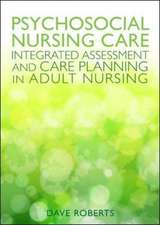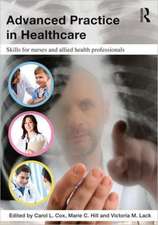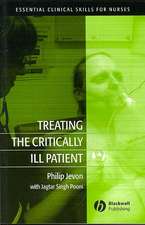Expanding Nursing Knowledge
en Limba Engleză Paperback – 15 dec 1997
Clear explanations are given of the different types of knowledge practitioners possess and the book encourages them to consider the personal and experiential theory which informs their clinical decisions.
Preț: 205.12 lei
Preț vechi: 215.91 lei
-5% Nou
Puncte Express: 308
Preț estimativ în valută:
39.25€ • 41.09$ • 32.48£
39.25€ • 41.09$ • 32.48£
Carte tipărită la comandă
Livrare economică 05-19 aprilie
Preluare comenzi: 021 569.72.76
Specificații
ISBN-13: 9780750630139
ISBN-10: 0750630132
Pagini: 224
Ilustrații: 12 ills.
Dimensiuni: 140 x 216 x 14 mm
Greutate: 0.3 kg
Ediția:2
Editura: Elsevier
Locul publicării:United Kingdom
ISBN-10: 0750630132
Pagini: 224
Ilustrații: 12 ills.
Dimensiuni: 140 x 216 x 14 mm
Greutate: 0.3 kg
Ediția:2
Editura: Elsevier
Locul publicării:United Kingdom
Public țintă
PREP; post-registration nurses and midwives, ENB courses, lecturers, supervisors. Also appropriate for some diploma and pre-registration degree courses.Cuprins
PART ONE: Understanding Your Practice; Nursing Knowledge; Professional Judgement; PART TWO: Researching Your Practice; A new Paradigm for the practitioner-researcher; Single case experimental research; Reflective case study research; Reflexive action research; Epilogue
Recenzii
'Unusually, I want to start this book review by looking at the book's cover. This shouts the title at you three times in white, orange and lime green on a pink background, demanding your attention and seeming to say, in a sort of 70s way, 'this book is about something new and it will blow your mind'. Those familiar with Rolfe's previous book (Rolfe 1996) and his other writings will be aware of his claims for newness and personal innovation in seeking to put forward a new paradigm for nursing, and here a new paradigm for nursing research...
The present book, therefore, needs to be considered within the context of a number of other recent books concerned with the two topics it addresses, the development of theory in nursing and practitioner research and the place of practitioner knowledge, whether from research or experience, in the promotion of clinical effectiveness.
The book is divided clearly into two parts. The first part deals with the types of knowledge underpinning nursing practice and the ways in which these types of knowledge are generated, and the second is concerned with practitioner research and three approaches practitioners might use to undertake research. In the preface Rolfe indicates that this book, "can be seen as a companion to my earlier book" (p. viii), and I would suggest that it is essential when reading this book that the first is also available.
The main arguments put forward are that insufficient attention is given to knowledge generated from practice, which, by its nature, is relevant to practice, and to the question of how different types of knowledge may be incorporated into practice. The case is then argued for all nurses to be involved in practitioner-centred research, although Rolfe contends that few nurses are involved in the self-aware practice required of the practitioner-centred researcher. These issues are at the heart of the clinical effectiveness debate which is, in effect, concerned with the temperature taking question over and over again, that is, how relevant is this research finding to clinical practice?
The first part of the book discusses the types of knowledge used in nursing and the process by which the self-aware nurse is able to identify and integrate personal, scientific and experimental knowledge into practice. A useful diagram of a model of professional judgement is provided, which is also found in the first book as a model of nursing praxis...
The second half of the book extends the understanding of the contribution practitioner research may make to the theory practice relationship...
The next chapters describe three approaches to research which the practitioner may use: single-case experiments, case study research and action research. These chapters provide a useful discussion of the strengths and challenges of these approaches. All three approaches are eminently suitable for practitioner research or practitioner-centred research and this part of the book would be particularly useful for practitioners starting out on research who, when faced with the extensive literature on research design and methods, can be totally overwhelmed. This book has the potential to prevent them being seduced by other designs which may be in current vogue...
In the final chapter Rolfe tackles the issue of the standing of the knowledge generated by practitioner research and puts forward a suggestion for the development of critical communities of practitioner researchers. Here he has identified both the research issues surrounding practitioner research and the organizational context which may or may not support practitioner research...
The ground covered in this book is extensive. In the preface Rolfe indicates that the first half was included as an explanation, for those coming from a more traditional research position, of the theoretical issues relevant to practitioner research. The second half will have more immediate relevance to practitioner researchers or practitioner-centred researchers whether they agree or not with the theoretical arguments made in the first part... it certainly challenges all of us to think and makes an important contribution to the debate on research by practitioners.'
Rosamund Bryar, Clinical Effectiveness in Nursing (1998) 2, 162-168.
The present book, therefore, needs to be considered within the context of a number of other recent books concerned with the two topics it addresses, the development of theory in nursing and practitioner research and the place of practitioner knowledge, whether from research or experience, in the promotion of clinical effectiveness.
The book is divided clearly into two parts. The first part deals with the types of knowledge underpinning nursing practice and the ways in which these types of knowledge are generated, and the second is concerned with practitioner research and three approaches practitioners might use to undertake research. In the preface Rolfe indicates that this book, "can be seen as a companion to my earlier book" (p. viii), and I would suggest that it is essential when reading this book that the first is also available.
The main arguments put forward are that insufficient attention is given to knowledge generated from practice, which, by its nature, is relevant to practice, and to the question of how different types of knowledge may be incorporated into practice. The case is then argued for all nurses to be involved in practitioner-centred research, although Rolfe contends that few nurses are involved in the self-aware practice required of the practitioner-centred researcher. These issues are at the heart of the clinical effectiveness debate which is, in effect, concerned with the temperature taking question over and over again, that is, how relevant is this research finding to clinical practice?
The first part of the book discusses the types of knowledge used in nursing and the process by which the self-aware nurse is able to identify and integrate personal, scientific and experimental knowledge into practice. A useful diagram of a model of professional judgement is provided, which is also found in the first book as a model of nursing praxis...
The second half of the book extends the understanding of the contribution practitioner research may make to the theory practice relationship...
The next chapters describe three approaches to research which the practitioner may use: single-case experiments, case study research and action research. These chapters provide a useful discussion of the strengths and challenges of these approaches. All three approaches are eminently suitable for practitioner research or practitioner-centred research and this part of the book would be particularly useful for practitioners starting out on research who, when faced with the extensive literature on research design and methods, can be totally overwhelmed. This book has the potential to prevent them being seduced by other designs which may be in current vogue...
In the final chapter Rolfe tackles the issue of the standing of the knowledge generated by practitioner research and puts forward a suggestion for the development of critical communities of practitioner researchers. Here he has identified both the research issues surrounding practitioner research and the organizational context which may or may not support practitioner research...
The ground covered in this book is extensive. In the preface Rolfe indicates that the first half was included as an explanation, for those coming from a more traditional research position, of the theoretical issues relevant to practitioner research. The second half will have more immediate relevance to practitioner researchers or practitioner-centred researchers whether they agree or not with the theoretical arguments made in the first part... it certainly challenges all of us to think and makes an important contribution to the debate on research by practitioners.'
Rosamund Bryar, Clinical Effectiveness in Nursing (1998) 2, 162-168.







